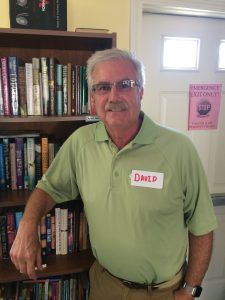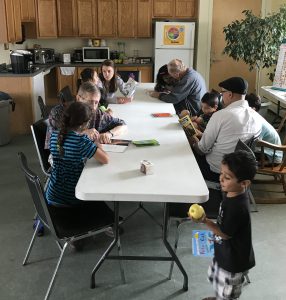The Summer Readers program has wrapped up for 2017, but we’d like to take a moment to speak with the volunteers that make the program possible.
The Portland Rotary Club has invested many members and hours to the program since the beginning. Laura Young, the previous president of the Rotary Club, remembers the inception of the Club’s involvement in the program:
“In 2014, we had a club assembly to determine how we wanted to focus our local charitable giving and service work. We identified childhood hunger and education as our goals for the next 3-5 years. We had conversations with staff members at United Way and Portland ConnectED. Through those conversations, we came up with our first activity in the summer of 2014, Summer Reading, which was perfect because it addressed both childhood hunger and reading in one project. That was the first summer that Portland Rotary adopted the North Deering Gardens food site.”
David Small, a member of the Rotary Club, remembers the immediate appeal of the program:
“I always enjoyed reading to my children and grandchildren. When the club latched on to United Way’s reading program, I immediately said, ‘Yeah, I’ve got time to volunteer.’ And they needed a site leader [at North Deering], so I volunteered to do that.”
The Summer Readers program addresses the “summer slide,” the enhancement of Pre-K to 3rd grade literacy instruction, and the need for community-based support for students, three of the six strategies the club had created for helping childhood education.
“The impact is seen immediately when the kids come in excited to pick out a book and read. Getting kids engaged and enthusiastic about reading is so important for encouraging summer literacy,” says Stephanie Nicoson, an AmeriCorps Vista, member of the Starting Strong team, and lead organizer of the program in 2018.
“There’s a huge need out there,” says David. “There are a lot of families who are quite food-insecure, and these programs can go a long way in helping kids, both in hunger and education.”

Laura believes the effectiveness of the program comes from it being “a combination of both a food site and a reading program. Having books and food at the same location makes both efforts strong.”
The persistence of the program has proven to be the key to its success. David remembers the hesitancy of the first year versus the enthusiasm of the present:
“Initially, we found that most of the kids were coming in just to get something to eat. They were shy, unsure if they wanted to read or not read. Now, they come in very enthusiastic about picking out a book and, in many cases, reading to us. Or, if they’re too young, they are at least very enthusiastic about being read to. They take pride in owning the books. I guess that’s what keeps me coming back, that it’s a very successful program, and this year they’ve been coming in in large numbers, typically 14 or 15 a week, eager to read.
I continue to do it because, more and more, the kids are coming in enthusiastic about reading. They seem to take pride in owning the books. We have stickers that we put on the inside of the books where they write their name, and they take those books home to build a little library to share with their family.”
“It’s the benefit of being there year after year,” says Laura. “The trust level has grown and it’s become a lot of fun. We’ve been doing this each summer since 2014 and the experience just gets better and better every year; we’ve developed relationships with the kids.”
While long-term results of such tenacity are satisfying, there is also an immediate value to the same work ethic. Stephanie shared a memory that demonstrates this:
“I was paired with a girl who spoke very limited English. She was very reserved at first, not talking or reading much. As I continued to ask her what certain words were in her native language, French, and point to pictures to help clarify, she started smiling, laughing and getting excited to see what the words were in English. It was a perfect example of what engaged reading can do.”

While volunteering is often its own reward, everyone would agree that a little recognition is always nice. Thankfully, the kids are happy to comply:
Laura: “Getting hugs from the kids that remembered me from the years before, happy to see us, is really rewarding. There’s one kid going into the 5th grade, and each year he sees me, he says, ‘I remember you!’”
David: “When I went to Lyseth during the school year, some of the kids who I had read with at North Deering Gardens recognized me and said, ‘Hi, I know you! You read to us in the summer-time!’ That brought a big smile to my face, that they recognized and remembered me.”
Posted: September 29, 2017 by toptiertesting_6kjd7p
Feeding Bodies and Minds: Meeting the Volunteers of Starting Strong
The Summer Readers program has wrapped up for 2017, but we’d like to take a moment to speak with the volunteers that make the program possible.
The Portland Rotary Club has invested many members and hours to the program since the beginning. Laura Young, the previous president of the Rotary Club, remembers the inception of the Club’s involvement in the program:
“In 2014, we had a club assembly to determine how we wanted to focus our local charitable giving and service work. We identified childhood hunger and education as our goals for the next 3-5 years. We had conversations with staff members at United Way and Portland ConnectED. Through those conversations, we came up with our first activity in the summer of 2014, Summer Reading, which was perfect because it addressed both childhood hunger and reading in one project. That was the first summer that Portland Rotary adopted the North Deering Gardens food site.”
David Small, a member of the Rotary Club, remembers the immediate appeal of the program:
“I always enjoyed reading to my children and grandchildren. When the club latched on to United Way’s reading program, I immediately said, ‘Yeah, I’ve got time to volunteer.’ And they needed a site leader [at North Deering], so I volunteered to do that.”
The Summer Readers program addresses the “summer slide,” the enhancement of Pre-K to 3rd grade literacy instruction, and the need for community-based support for students, three of the six strategies the club had created for helping childhood education.
“The impact is seen immediately when the kids come in excited to pick out a book and read. Getting kids engaged and enthusiastic about reading is so important for encouraging summer literacy,” says Stephanie Nicoson, an AmeriCorps Vista, member of the Starting Strong team, and lead organizer of the program in 2018.
“There’s a huge need out there,” says David. “There are a lot of families who are quite food-insecure, and these programs can go a long way in helping kids, both in hunger and education.”
Laura believes the effectiveness of the program comes from it being “a combination of both a food site and a reading program. Having books and food at the same location makes both efforts strong.”
The persistence of the program has proven to be the key to its success. David remembers the hesitancy of the first year versus the enthusiasm of the present:
“Initially, we found that most of the kids were coming in just to get something to eat. They were shy, unsure if they wanted to read or not read. Now, they come in very enthusiastic about picking out a book and, in many cases, reading to us. Or, if they’re too young, they are at least very enthusiastic about being read to. They take pride in owning the books. I guess that’s what keeps me coming back, that it’s a very successful program, and this year they’ve been coming in in large numbers, typically 14 or 15 a week, eager to read.
I continue to do it because, more and more, the kids are coming in enthusiastic about reading. They seem to take pride in owning the books. We have stickers that we put on the inside of the books where they write their name, and they take those books home to build a little library to share with their family.”
“It’s the benefit of being there year after year,” says Laura. “The trust level has grown and it’s become a lot of fun. We’ve been doing this each summer since 2014 and the experience just gets better and better every year; we’ve developed relationships with the kids.”
While long-term results of such tenacity are satisfying, there is also an immediate value to the same work ethic. Stephanie shared a memory that demonstrates this:
“I was paired with a girl who spoke very limited English. She was very reserved at first, not talking or reading much. As I continued to ask her what certain words were in her native language, French, and point to pictures to help clarify, she started smiling, laughing and getting excited to see what the words were in English. It was a perfect example of what engaged reading can do.”
While volunteering is often its own reward, everyone would agree that a little recognition is always nice. Thankfully, the kids are happy to comply:
Laura: “Getting hugs from the kids that remembered me from the years before, happy to see us, is really rewarding. There’s one kid going into the 5th grade, and each year he sees me, he says, ‘I remember you!’”
David: “When I went to Lyseth during the school year, some of the kids who I had read with at North Deering Gardens recognized me and said, ‘Hi, I know you! You read to us in the summer-time!’ That brought a big smile to my face, that they recognized and remembered me.”
Share this:
Category: Uncategorized
Recent Posts
Categories